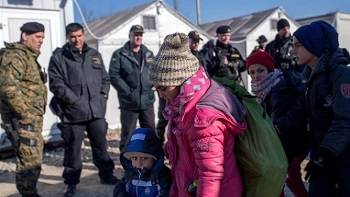The UN is warning of a growing humanitarian challenge along Macedonia's border with Greece as thousands fleeing war in the Middle East and beyond remain stuck in limbo.
Tensions are high as temperatures dip and many refugees - fearing they will not be able to continue their journey - continued to demand on Sunday that they be allowed to cross.
Four Balkans countries have announced a daily cap on how many people can pass through and Austria has restricted entry for hundreds of thousands.
Following the border shutdowns, Greece, a primary gateway to Europe, has been inundated with refugees.
People are trying to make their way to western and northern Europe, but border controls are forcing many into already overcrowded camps. Only some Iraqis and Syrians have been allowed to cross.
Biggest migration crisis
Greek officials say the number of refugees trapped in the country may reach 70,000 in the coming weeks, although a NATO plan to crack down on smugglers could limit the flow of migration significantly.
Europe is in the second year of its biggest migration crisis since World War II.
"We estimate that we will have a number of people trapped in our country which will be between 50,000 and 70,000. ... I believe in the coming month," Yannis Mouzalas, the immigration minister, told Greek Mega TV on Sunday.
About 22,000 migrants and refugees were already in Greece, he said.
Reporting Idomeni, a small community on Greece's northern border with Macedonia, Al Jazeera's Hoda Abdel-Hamid said: "People have blocked the railway to put pressure on authorities. By doing that, they're hoping the border with Macedonia will open.
"Many here are not aware that it's not just Macedonia which has blocked borders."
She said nongovernmental organizations were running out of supplies for the refugees.
There were about 2,000 meals left for at least 7,000 people at the camp, she said.
Increasing curbs
More buses with refugees were on their way to Idomeni despite increasing restrictions on transit through borders.
"Everybody is afraid of March 1," Al Jazeera's Abdel-Hamid said.
"They have heard of reports that maybe tomorrow, borders will close to everyone."
Last week, NATO diplomats said ships already deployed in the Aegean Sea, including Turkish and Greek vessels, would pass intelligence and reconnaissance information to Turkish and Greek coastguards and to the EU border agency, Frontex, and also return to Turkey any people rescued by NATO crews.
The plan is aimed at complementing an EU accord with Turkey to stem the flow of refugees arriving in Europe.
"If the NATO plan is implemented ... it could reduce the inflow by about 70 percent," Greece's Mouzalas said in the TV interview.
Asked whether the operation could end arrivals, he said: "No, migration cannot be sealed."
Greece has asked for emergency funding from Europe to tackle the unprecedented crisis, Mouzalas said, without providing details on the amount requested.
It has asked for tents, blankets, sleeping bags, transport vehicles and ambulances among other supplies, a government official told Reuters news agency.
PHOTO CAPTION
Refugees pass next to Czech, Slovakian and Macedonian police officers, after they crossed the border between Greece and Macedonia near Gevgelija, The Former Yugoslav Republic of Macedonia, 07 February 2016.
Al-Jazeera


 Home
Home Discover Islam
Discover Islam Quran Recitations
Quran Recitations Lectures
Lectures
 Fatwa
Fatwa Articles
Articles Fiqh
Fiqh E-Books
E-Books Boys & Girls
Boys & Girls  Ramadan
Ramadan Fatwa Audios
Fatwa Audios Month of Mercy
Month of Mercy Women
Women Eed Al- Fitr
Eed Al- Fitr Food Recipes
Food Recipes Videos
Videos

 Prayer Times
Prayer Times












